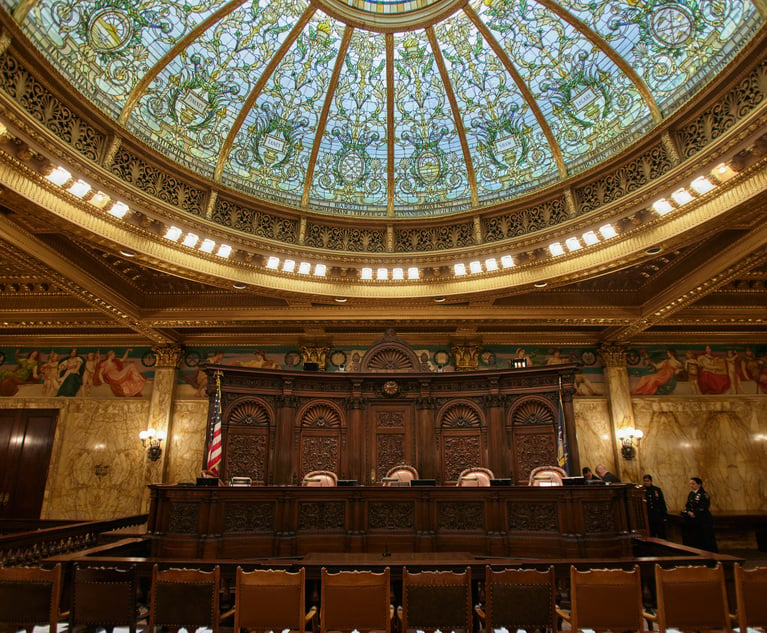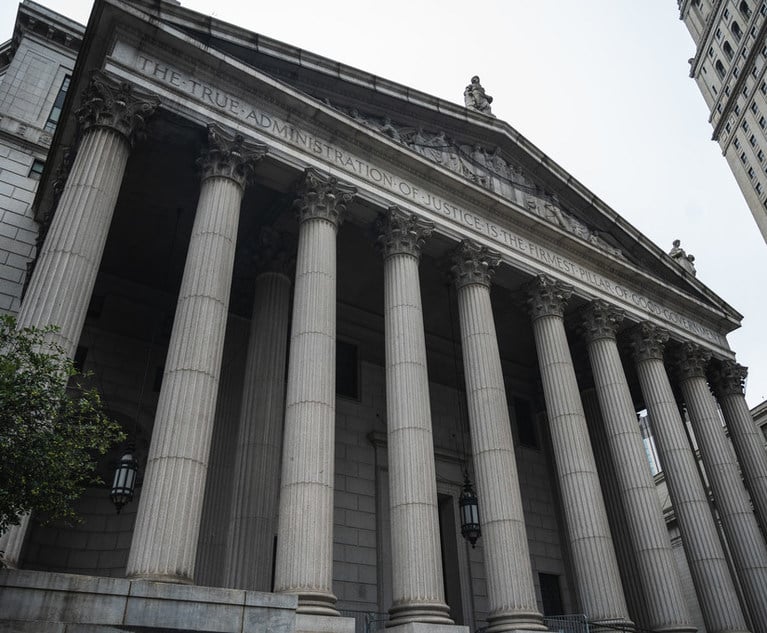State Attorneys General and Their Influence on Merger Enforcement
Although the Department of Justice (DOJ) and the Federal Trade Commission (FTC) are the principal merger enforcers in this country, state attorneys general (state AGs) can, and often do, play a major role in merger review as well.
September 12, 2018 at 02:15 PM
8 minute read
 Shepard Goldfein and Karen Hoffman Lent
Shepard Goldfein and Karen Hoffman Lent
Although the Department of Justice (DOJ) and the Federal Trade Commission (FTC) are the principal merger enforcers in this country, state attorneys general (state AGs) can, and often do, play a major role in merger review as well. State AGs have the authority to challenge mergers and acquisitions under federal antitrust laws and most state antitrust statutes, but they typically only do so in partnership with federal antitrust enforcers. This is because state AGs have more limited resources than their federal counterparts and do not have access to the same enforcement tools granted to the DOJ and FTC under the federal premerger review process. Recently, however, states have been active in merger enforcement, with state AGs opposing high-profile transactions both alongside, and independent from, the federal enforcers, including Bayer AG's proposed $62 billion acquisition of Monsanto. This potential uptick in state AG merger enforcement offers a reminder that states can pose a major obstacle to merger clearance. This article reviews the powers granted to states under federal antitrust statutes and discusses how some state AGs have commenced an effort to assert more influence in merger enforcement.
Legal Standard and Advantages of Joint Federal-State Actions
State AGs have the express power under Sections 4 and 16 of the Clayton Act to independently sue to enjoin a merger or acquisition. But State AGs do not have access to the same investigative tools as federal enforcers, such as automatically receiving merger notifications under the Hart-Scott-Rodino Antitrust Improvements Act (HSR Act). For this reason, state AGs more typically allow the federal agencies to take the lead in merger investigations and enforcement actions, thus enabling states to conserve their limited resources and benefit from the investigative tools granted to the DOJ and FTC pursuant to the HSR Act. The HSR Act contains confidentiality provisions that prohibit the federal agencies from sharing information gathered pursuant to the HSR Act with state AGs absent the consent of the merging parties. In order to avoid the burden of having to comply with multiple demands for information—that is, from the DOJ or FTC under the HSR Act and from state AGs through subpoena powers granted by state antitrust statutes—the parties generally provide such consent. Upon receiving consent from the merging parties, the federal agencies are permitted to provide state AGs with copies of any issued civil investigative demands or second requests. The states will typically then “piggy back” on the federal investigation by issuing subpoenas to the merging parties seeking “all information and documents provided to [DOJ or FTC],” thereby enabling them to receive productions from the parties that are identical to those obtained by DOJ or FTC. Alternatively, state AGs can ask the merging firms to voluntarily provide their productions to states under the NAAG Compact, which the National Association of Attorneys General (NAAG) issued in 1987. The compact provides that merging firms can voluntarily give their initial HSR filings and second request productions to a “liaison state,” which in turn can make them available to interested states who are parties to the compact, thus simplifying the process.
In addition to these procedural advantages, there are strategic and cost-related reasons why state AGs typically partner with federal antitrust enforcers when investigating a transaction. For example, it is common for state AGs and the federal agencies to coordinate during the investigation and discuss their respective findings and analyses. Upon the consent of the parties, state representatives can also attend depositions and participate in third-party interviews performed by the federal agency investigating the merger. Further, if the states and the federal agency decide to sue to enjoin a transaction, they can file a joint complaint and work together throughout the litigation to reach mutually acceptable consent decrees with the merging parties. These attendant benefits of partnering with the federal agency reviewing a transaction greatly reduce the amount of resources that state AGs must commit to merger investigations, thus making it possible for them to allocate resources to other regulatory matters affecting their states.
State AGs Suing Independently or as Part of a Multi-State Working Group
Although state AGs usually investigate and challenge transactions in partnership with federal antitrust enforcers, they sometimes do so independently or as part of an independent multi-state working group. As discussed above, merger investigations and enforcement actions are costly and time consuming, requiring significant commitments of personnel and resources. Further, in the absence of federal support, state AGs are restricted to the investigative tools provided by state antitrust statutes and the Federal Rules of Civil Procedure. Forming a multi-state working group helps relieve some of these burdens, however, allowing participating State AGs to coordinate responsibilities and share in costs. These strategic disadvantages notwithstanding, state AG merger challenges are not prejudiced by contrary enforcement decisions by the DOJ or FTC. Indeed, in considering whether to permit a state AG merger challenge to go forward, courts generally give limited precedential weight to the respective federal antitrust agency's decision not to challenge the transaction, see, e.g., State of California v. Valero Energy, No. C 17-03786 WHA, 2017 WL 3705059 (N.D. Cal. Aug 28, 2017) (noting that the FTC had taken no action to block the deal, but finding that the state had “raised serious questions regarding whether the proposed transactions will have anticompetitive effects”), even in cases where the DOJ has published a detailed competitive impact statement as part of a settlement and consent decree.
Despite the strategic and cost-related disadvantages of challenging a merger without federal support, there have been several state-only enforcement actions over the past two years. This potential uptick in state-only merger enforcement activity appears to be the result of concern among some state AGs that the Trump administration will be less active in merger enforcement. For example, at the ABA Section of Antitrust Law Spring Meeting in May 2017, Beau Buffier, the chief of the Antitrust Bureau of the Office of the Attorney General of New York, said that New York and other states were preparing to step in should the federal agencies not be vigilant. He also noted that the New York AG and other state AG offices were improving their standalone merger enforcement capabilities by committing additional resources to their antitrust divisions and upgrading internal investigative tools, such as e-discovery platforms. These developments, along with recent high-profile state merger challenges, suggest that states may be increasing their enforcement efforts due to a perceived reduction in federal enforcement.
Recent High-Profile State Enforcement Actions
Recent state AG merger enforcement actions illustrate that state-level merger enforcement activity is potentially on the rise, and state AGs are willing to bring their own merger investigations and lawsuits even in the absence of action from their federal counterparts. For example, in June 2017, the California AG independently sued to block the proposed acquisition of two San Francisco-area petroleum terminals by Valero Energy Corp., despite the fact that the FTC had declined to challenge the proposed transaction. The California AG brought its action under the Clayton Act and the California Business and Professional Code, arguing that the acquisition would give Valero Energy control of the only remaining petroleum refineries with spare capacity in the state, thereby enabling it to sharply increase gas prices. Faced with the uncertainty and expense of defending against a lengthy taxpayer-funded lawsuit, Valero abandoned the deal and the California AG touted the outcome as a win for Californians. This is the sort of transaction that the federal agencies typically leave to the state AG to enforce, because the assets involved were located within a single state and had little effect on other states.
Similarly, in August, five state AGs—from California, Iowa, Massachusetts, Mississippi and Oregon—broke with the DOJ and announced their opposition to Bayer AG's $62 billion acquisition of Monsanto, which the DOJ had decided to permit to close with conditions. In a comment letter opposing the DOJ's decision, the state AGs argued that the $9 billion divestiture remedy that the parties had agreed to in exchange for federal clearance failed to adequately address the increased market concentration and consumer harm that may result from the merger. Public comment must remain open for at least 60 days before a federal court may accept the agreement between the DOJ and the merging parties and enter a final judgment on the merger. Then, the five state AGs opposing the proposed judgement will have to decide whether to sue to block the transaction on their own, despite the fact that the DOJ has already allowed it.
Conclusion
State AGs can, and increasingly do, play a major role in merger enforcement. Although state AGs typically investigate and challenge mergers in partnership with the federal antitrust enforcers on account of the strategic and cost-saving advantages of joint federal-state actions, they occasionally do so on their own or as part of a multi-state working group. Recently, states have been active in merger enforcement, with state AGs opposing several high-profile transactions that federal enforcers allowed to proceed, including Valero's attempted acquisition of petroleum refineries in 2017 and Bayer's current proposal to acquire Monsanto. These actions suggest that state-level merger activity may be on the rise, and state AGs may be increasingly willing to bring their own merger challenges even in the absence of action from the DOJ or FTC.
Shepard Goldfein and Karen Hoffman Lent are partners at Skadden, Arps, Slate, Meagher & Flom.
This content has been archived. It is available through our partners, LexisNexis® and Bloomberg Law.
To view this content, please continue to their sites.
Not a Lexis Subscriber?
Subscribe Now
Not a Bloomberg Law Subscriber?
Subscribe Now
NOT FOR REPRINT
© 2025 ALM Global, LLC, All Rights Reserved. Request academic re-use from www.copyright.com. All other uses, submit a request to [email protected]. For more information visit Asset & Logo Licensing.
You Might Like
View All
Decision of the Day: Trial Court's Sidestep of 'Batson' Deprived Defendant of Challenge to Jury Discrimination

Decision of the Day: Commercial Division Finds Defendant Engaged in Unfair Competition Against Plaintiff

Decision of the Day: Court Rules on Judgment Motions Over Police Killing of Pet Dog While Executing Warrant

Decision of the Day: JFK to Paris Stowaway's Bail Revocation Explained
Trending Stories
- 1Gunderson Dettmer Opens Atlanta Office With 3 Partners From Morris Manning
- 2Decision of the Day: Court Holds Accident with Post Driver Was 'Bizarre Occurrence,' Dismisses Action Brought Under Labor Law §240
- 3Judge Recommends Disbarment for Attorney Who Plotted to Hack Judge's Email, Phone
- 4Two Wilkinson Stekloff Associates Among Victims of DC Plane Crash
- 5Two More Victims Alleged in New Sean Combs Sex Trafficking Indictment
Who Got The Work
J. Brugh Lower of Gibbons has entered an appearance for industrial equipment supplier Devco Corporation in a pending trademark infringement lawsuit. The suit, accusing the defendant of selling knock-off Graco products, was filed Dec. 18 in New Jersey District Court by Rivkin Radler on behalf of Graco Inc. and Graco Minnesota. The case, assigned to U.S. District Judge Zahid N. Quraishi, is 3:24-cv-11294, Graco Inc. et al v. Devco Corporation.
Who Got The Work
Rebecca Maller-Stein and Kent A. Yalowitz of Arnold & Porter Kaye Scholer have entered their appearances for Hanaco Venture Capital and its executives, Lior Prosor and David Frankel, in a pending securities lawsuit. The action, filed on Dec. 24 in New York Southern District Court by Zell, Aron & Co. on behalf of Goldeneye Advisors, accuses the defendants of negligently and fraudulently managing the plaintiff's $1 million investment. The case, assigned to U.S. District Judge Vernon S. Broderick, is 1:24-cv-09918, Goldeneye Advisors, LLC v. Hanaco Venture Capital, Ltd. et al.
Who Got The Work
Attorneys from A&O Shearman has stepped in as defense counsel for Toronto-Dominion Bank and other defendants in a pending securities class action. The suit, filed Dec. 11 in New York Southern District Court by Bleichmar Fonti & Auld, accuses the defendants of concealing the bank's 'pervasive' deficiencies in regards to its compliance with the Bank Secrecy Act and the quality of its anti-money laundering controls. The case, assigned to U.S. District Judge Arun Subramanian, is 1:24-cv-09445, Gonzalez v. The Toronto-Dominion Bank et al.
Who Got The Work
Crown Castle International, a Pennsylvania company providing shared communications infrastructure, has turned to Luke D. Wolf of Gordon Rees Scully Mansukhani to fend off a pending breach-of-contract lawsuit. The court action, filed Nov. 25 in Michigan Eastern District Court by Hooper Hathaway PC on behalf of The Town Residences LLC, accuses Crown Castle of failing to transfer approximately $30,000 in utility payments from T-Mobile in breach of a roof-top lease and assignment agreement. The case, assigned to U.S. District Judge Susan K. Declercq, is 2:24-cv-13131, The Town Residences LLC v. T-Mobile US, Inc. et al.
Who Got The Work
Wilfred P. Coronato and Daniel M. Schwartz of McCarter & English have stepped in as defense counsel to Electrolux Home Products Inc. in a pending product liability lawsuit. The court action, filed Nov. 26 in New York Eastern District Court by Poulos Lopiccolo PC and Nagel Rice LLP on behalf of David Stern, alleges that the defendant's refrigerators’ drawers and shelving repeatedly break and fall apart within months after purchase. The case, assigned to U.S. District Judge Joan M. Azrack, is 2:24-cv-08204, Stern v. Electrolux Home Products, Inc.
Featured Firms
Law Offices of Gary Martin Hays & Associates, P.C.
(470) 294-1674
Law Offices of Mark E. Salomone
(857) 444-6468
Smith & Hassler
(713) 739-1250






